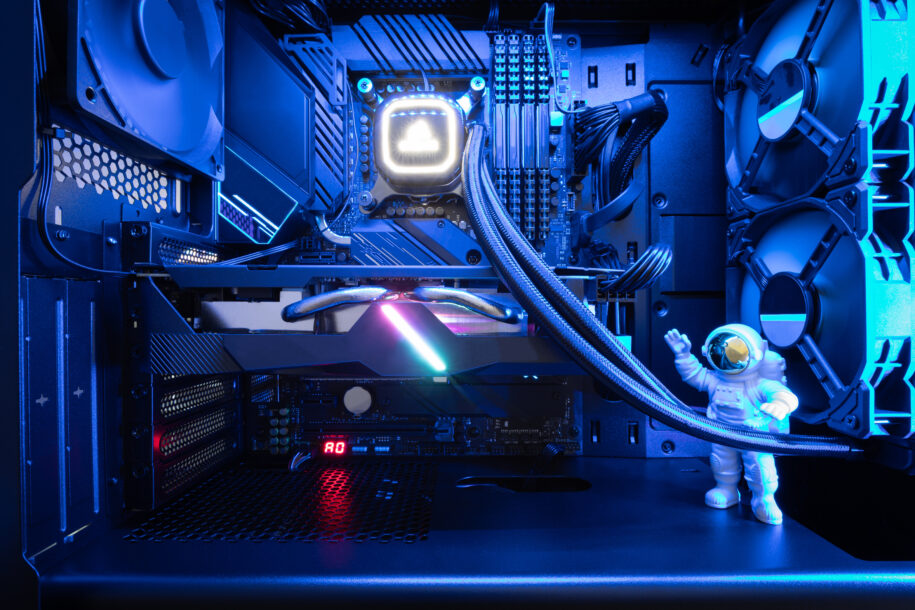
In gaming PCs you have a couple options when it comes to cooling your system. Liquid cooling vs air cooling are the main consideration you will need to consider when it comes to deciding on what you want in your gaming PC. Ultimately there is no wrong decision, both solutions can offer great performance that keeps your system cool and performing well. The choice between these two cooling methods has become more nuanced as hardware has gotten more powerful. Let’s look at the benefits and drawbacks of either cooling method – to determine which is the right option for your PC.
Table of Contents
Liquid Cooling vs Air Cooling – Performance & Efficiency
Liquid cooling systems are known for their superior performance and efficiency. By transferring heat away from the components via a liquid coolant, these systems can maintain lower temperatures even under heavy loads. This translates to enhanced stability and the potential for overclocking without thermal throttling.
Continued advancements in air cooling have narrowed this performance gap considerably. High-quality air coolers equipped with multiple heat pipes, dense fin arrays, and powerful fans can rival the cooling prowess of their liquid counterparts. Innovative designs and materials mean that certain air coolers can keep up with liquid cooling.
Liquid Cooling vs Air Cooling: Noise & Aesthetics
One of the primary drawbacks of traditional air cooling solutions has always been the noise generated by fast-spinning fans. In contrast, liquid cooling setups often operate with minimal noise, thanks to the absence of moving parts aside from the pump and fans that are running at lower RPMs on the radiator. This quiet operation can greatly enhance the gaming experience, allowing players to immerse themselves in their games distraction free.
Additionally, liquid cooling systems offer unparalleled aesthetic appeal, especially with the rise of custom loops with RGB lighting effects or AIO radiators with RGB. Liquid cooling can offer another way to further make you PC uniquely your own. However, the complexity and cost of custom liquid cooling loops may not be interesting to someone who is prioritizing simplicity and affordability.
Liquid Cooling vs Air Cooling: Maintenance & Reliability
When it comes to maintenance, air cooling has a clear advantage over liquid cooling. Air coolers require minimal upkeep, grab a can of air or an electric duster and blow things out every once in a while. On the other hand, liquid cooling systems demand more attention, including regular checks for leaks, pump functionality, and coolant levels. While modern closed-loop liquid coolers mitigate many of these concerns, the risk of component failure or leakage remains a potential drawback.
In terms of reliability, both cooling methods have their strengths and weaknesses. Air coolers are simple and reliable, but typically will lag behind liquid cooling temps. Even if a fan were to malfunction, the system would likely remain operational, albeit with reduced cooling capacity. Liquid cooling systems, while generally reliable, are more vulnerable to leaks and pump failures, which can result in significant damage if not addressed promptly.
Liquid Cooling vs Air Cooling: Cost Considerations
Cost is a crucial factor for many gamers when choosing between liquid cooling and air cooling. In general, air cooling setups are more affordable upfront, with high-quality air coolers available at a fraction of the cost of liquid cooling components. This makes air cooling an attractive option for budget-conscious gamers or those prioritizing value over ultimate performance.
On the other hand, liquid cooling systems, particularly custom loops, can be significantly more expensive to purchase and install. The cost of premium components, such as radiators, pumps, water blocks, and fittings, can quickly add up. Factor in the additional expense of coolant, tubing, and maintenance supplies, and the price gap between liquid and air cooling becomes even more pronounced. However, for enthusiasts willing to invest in top-tier performance and aesthetics, the premium price may be justified.
AIOs offer a nice in between. They get rid of the upkeep of a full custom loop, are easy to install, perform great, and are cost effective. This is why you see many of our prebuilt systems using AIOs.
Liquid Cooling vs Air Cooling – Final Thoughts
There is no one-size-fits-all solution when it comes to deciding on how to cool your PC. Each method has its own strengths and weaknesses, and the optimal choice depends on a variety of factors, including performance requirements, noise tolerance, aesthetic preferences, maintenance considerations, and budget constraints.
Liquid cooling remains the gold standard. Its superior heat dissipation capabilities and sleek aesthetic appeal make it a favorite among enthusiasts and competitive gamers alike. However, the complexity, cost, and maintenance requirements of liquid cooling may deter casual users or those on a tight budget. Thankfully this can be avoided by opting for an AIO cooler, which is what we utilize in most of our gaming pcs in 2024.
Despite the popularity of AIO and liquid cooling in recent years, “traditional” air cooling continues to evolve, offering increasingly efficient and affordable solutions that rival the performance of liquid cooling setups. With advancements in fan technology and heatsink design, air coolers deliver impressive cooling performance while usually maintaining a lower price point and requiring minimal maintenance.
Ultimately, the choice between liquid cooling and air cooling comes down to personal preference and priorities. Whether you prioritize raw performance, quiet operation, eye-catching aesthetics, or budget-friendly solutions, there’s a cooling method tailored to your needs in the dynamic landscape of gaming PCs in 2024.
Whether you want a fully liquid cooled PC like our Hyper Liquid Series, or want to keep things simple with an AIO or air cooler, we have you covered for choice with the best selection of PC components.